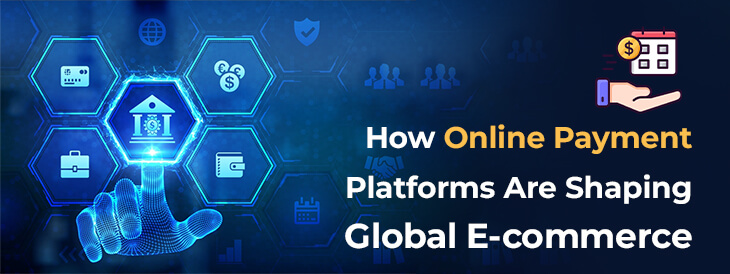How Online Payment Platforms Are Shaping Global E-commerce
How Online Payment Platforms Are Shaping Global E-commerce

Introduction to Online Payment Platforms
In the digital era, technology has revolutionized how we handle financial transactions. Online payment platforms stand at the forefront of this shift, playing a vital role in the burgeoning e-commerce landscape. These platforms have streamlined the way businesses and consumers engage in transactions, making it easier to conduct business across international borders.
One of the standout features of online payment platforms is their ability to handle diverse currencies and payment methods, which facilitates global trade. This has enabled businesses to extend their reach to new markets and customers, thereby driving growth and increasing brand visibility. Consumers benefit from the ease of making payments through various options such as credit cards, digital wallets, and even cryptocurrencies.
Moreover, the integration of these platforms with e-commerce sites is typically straightforward, allowing businesses to quickly set up and manage their online payment processes. The versatility of these platforms means they can accommodate businesses of all sizes, from large enterprises to small startups, enhancing their ability to compete in the global marketplace.
Customer experience is another area where online payment platforms excel. With features like one-click payments and mobile payment options, the checkout process becomes smooth and quick, significantly reducing cart abandonment rates. The user-friendly interfaces and the speed at which transactions are processed also contribute to an enhanced shopping experience.
The role of online payment platforms in shaping global e-commerce cannot be overstated. As the market continues to grow and evolve, these platforms will remain a central component, enabling seamless, secure, and efficient transactions worldwide.
Some Related Blogs
- Comparing Online Payment Platforms: Fees, Features, and Usability
- How to Choose the Best Online Payment Platform for Your Ecommerce Store
- Top Online Payment Platforms for Small Businesses in 2025
- High-Risk Payment Gateways vs. Traditional Payment Gateways: Key Differences
Benefits for Global E-commerce
Online payment platforms offer numerous advantages to global e-commerce. One notable benefit is the expanded reach and accessibility they provide to businesses. Supporting various currencies and payment methods allows companies to enter international markets and attract a wider audience, leading to increased sales and enhanced brand recognition.
These platforms also significantly improve the customer experience and foster trust. The convenience of one-click payments, digital wallets, and mobile payment options ensures a smooth shopping process, reducing cart abandonment and boosting conversion rates. Additionally, the assurance of secure transactions enhances trust between consumers and businesses, encouraging repeat purchases and customer loyalty.
By simplifying the checkout process, online payment platforms make it easier for customers to complete their purchases. This streamlined experience is especially important for mobile shoppers, who benefit from quick and efficient transactions. The flexibility of payment options also caters to diverse consumer preferences, further enhancing the shopping experience.
For businesses, the integration of these platforms is typically easy, allowing for quick setup and management of payment processes. This adaptability means that businesses of all sizes, from large enterprises to small startups, can benefit from these platforms, leveling the playing field in the global market. The ability to accommodate different business models and operational needs ensures that companies can focus on growth and innovation without worrying about payment logistics.
Overall, the advantages of online payment platforms are multifaceted, benefiting both consumers and businesses in various ways. Their role in improving accessibility, enhancing customer experience, and ensuring secure transactions makes them indispensable in the ever-evolving landscape of global e-commerce.
Security and Fraud Prevention
Online payment platforms prioritize the security of transactions and personal information by employing advanced technologies such as encryption, tokenization, and multi-factor authentication. These measures ensure that sensitive data is protected from potential cyber threats and unauthorized access.
A key component of these platforms’ security protocols is encryption, which encodes data so that only authorized parties can read it. Tokenization replaces sensitive information with unique identifiers, or tokens, which further reduces the risk of data breaches. Multi-factor authentication adds an extra layer of security by requiring users to provide two or more verification factors to access their accounts.
In addition to these security measures, online payment platforms leverage sophisticated algorithms and machine learning technologies to combat fraud. These systems continuously monitor transactions and analyze patterns to detect any unusual or suspicious activity. When anomalies are identified, the platform can take immediate action, such as flagging the transaction for further review or temporarily suspending the account to prevent unauthorized activities.
The proactive approach taken by online payment platforms in preventing fraud extends to collaboration with financial institutions and regulatory bodies. By sharing information and best practices, these platforms contribute to a broader network of fraud prevention efforts. This collaboration helps to create a more secure environment for online transactions, benefiting both businesses and consumers.
Moreover, many platforms offer features like transaction monitoring and reporting tools, allowing businesses to keep track of their financial activities and identify potential issues quickly. These tools provide valuable insights into transaction trends and help businesses implement additional security measures as needed.
Overall, the security and fraud prevention mechanisms employed by online payment platforms are essential in maintaining the integrity and trustworthiness of global e-commerce transactions.
Popular Online Payment Platforms
The market hosts several prominent online payment platforms, each designed to meet varied needs. PayPal stands out for its user-friendly interface and extensive global reach, supporting multiple currencies and making international transactions straightforward. Stripe, on the other hand, is preferred by many businesses due to its powerful API and seamless integration with various e-commerce platforms, making it a top choice for developers.
Square has carved a niche among small businesses and entrepreneurs, offering affordable pricing and versatile point-of-sale solutions that simplify in-person and online transactions. Alipay and WeChat Pay dominate the Asian market, especially in China, where they provide localized services and cater to a massive consumer base. These platforms have become integral to daily life in the region, making them indispensable for businesses targeting Chinese customers.
When choosing a platform, it’s crucial to consider factors like transaction fees, ease of integration, customer support, and security features. Each platform has unique strengths and can cater to different business models and consumer preferences. By carefully evaluating these aspects, businesses can select the platform that best fits their needs and supports their growth objectives.
![]()
Email us anytime!
Email customer service 24/7 at info@binarygateways.com
![]()
Call us anytime!
Reach customer care 24/7 at (801) 761-5001
